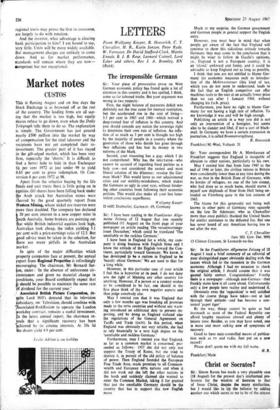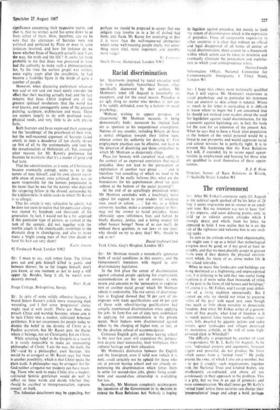Christ or Socrates?
Sir: Simon Raven has made a very plausible case (18 August) for the present day's intellectual pre- ference for the wisdom of Socrates to that of Jesus Christ, despite the many similarities, but I would like to tip the balance by adding another one which seems to me to be of the utmost significance concerning their respective merits, and that is, that no written word has come down to us from either of them. How, therefore, can we be sure that the utterances of Socrates were not polished and perfected by Plato or even in some instances invented, and how for instance do. we know whether Jesus of Nazareth actually said 'I am the way, the truth and the life'? It seems far more probable to me that Jesus was presumed to have had the authority to make such a pronouncement, for, by the time the earliest gospel was written, some eighty years after the crucifixion, he had become a God-like figure in the minds of quite a number of people.
However, when discussing preferences whatever was said or not said one must surely consider the effect that their teaching actually had; and the fact remains that Jesus Christ inspired one of the greatest spiritual revolutions that the world has ever known, and consequently some of the greatest painting, sculpture, architecture and music. These are matters largely to do with profound meta- physical needs, and very little to do with precise facts.
Both Socrates and Jesus expressed their contempt for the 'mouthings' of the priesthood of their time, but the well-reasoned argument of Socrates failed utterly to stem a decadence all too clearly shown up first of all by the sentimentality and later by the sensationalism of Hellenistic art. Yet, amongst other reasons for Mr Raven's preference for Socrates he maintains that its a matter of good and bad taste.
That the administration, as it were, of Christianity -became eventually corrupt, seems to be in the 'nature of man himself, and his own almost inevit- able abuse of power, once achieved. Jesus was no more responsible for the horrors perpetuated in his name than he was for the painter who depicted the simpering fellow in the shroud, surrounded by the kiddiewinkles in white socks to which Mr Raven is so allergic.
That his article is very subjective he admits, but he does not seem to realise that his particular allergy was shared by hundreds and thousands of his generation. In fact, I would not be a bit surprised if this particular type of picture, so current at the turn of the century, did not, together with the marble angels in the churchyards, contribute to the dramatic drop in churchgoing, and also to make many a bright young man of that time decide to have his hair cut very short!































 Previous page
Previous page